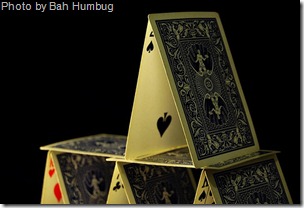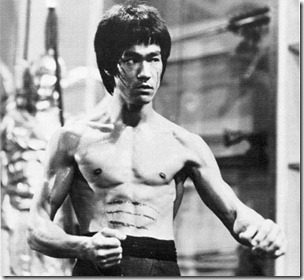Archive for the ‘Productivity’ Category
11 Reasons Why Perfection is Overrated!
 For years, I was a real perfectionist. Not just a weekend perfectionist mind you, a full-blown “I won’t do it unless it can be perfect” kind of perfectionist. In fact, with a number of things I still exhibit some pretty nasty perfectionist tendencies which I’m working on eradicating.
For years, I was a real perfectionist. Not just a weekend perfectionist mind you, a full-blown “I won’t do it unless it can be perfect” kind of perfectionist. In fact, with a number of things I still exhibit some pretty nasty perfectionist tendencies which I’m working on eradicating.
The reason I started this project (Refocuser) in 2009 instead of 1999 when I first had the idea is because I spent 10 years fighting with myself about how to make it perfect, all the way down to how I’d organize the site’s content on my hard drive. Ugh!
Naturally, striving for your best work isn’t a bad thing… most people would never want to swing to the other extreme where quality and pride in the work are void, because that’s a real slippery slope to mediocrity. But I’ve found that for me, that’s pretty much a non-option given my personality. Keeping my perfectionist tendencies in check doesn’t have to mean that the quality of my output is going to suffer.
What I focus on instead of perfection is doing enough to get the most out of my efforts. The second I start trending towards the familiar “over-focusing”, I force myself to stop in my tracks and self-evaluate. More time spent on an activity very rarely equals higher quality in the kinds of projects I do – in fact, many times, it ends up being counter-productive – so not being a perfectionist can actually improve my work.
More is lost through indecision than wrong decision – Carmela Soprano
Guarantee Success By Tracking Your Habits with Joe’s Goals
Habits form the basis for everything you do or will achieve. Your personal goals contribute to fulfilling the vision you have for yourself, but at the core it’s your habits that make it possible to reach those goals. Without forming new habits and replacing destructive behavior with positive habits, your goals will always remain distant – and without that consistent goal achievement, your vision might as well not exist.
The simplest way to think about this: your personal vision is your “ultimate goal”. It’s an inspirational but achievable future state of mind and being that indirectly influences your decisions and guides you down your best path. Your goals are interim milestones that contribute to fulfilling that vision – these are measurable and realistic targets that you use to base many of your actions. And your habits are the small steps you take every single day that bring you ever closer to your goals. This means they are the foundational element that everything builds on – your goals and your vision aren’t possible until you form the right habits.
Since many of us are visual, here’s a basic diagram showing how habits form the “bottom of the pyramid”.

Unfortunately, It’s not abnormal to get into a funk when it comes to your daily habits. One day “off” can easily snowball into 5 days or 5 weeks. It’s always easier to convince yourself that slacking off with a specific daily habit isn’t going to make a difference than it is to just do it. It’s amazing how powerful our internal motivation for slacking can actually be!
I’ve found for myself and for many others that the best way to return from a funk is to put the following two things into place:
- Track your habits daily (not weekly or monthly)
- Let other people see your progress
Spontaneity: Enabled Through Order and Organization
 One of the biggest myths in all of productivity and time management is the belief that being organized or having a grip on your life keeps you from having any agility, spontaneity, or ability to act on an impulse to do something last minute. “But if I have everything planned, what happens when I want to disappear to Vegas for the weekend” the purposely disorganized cry! It’s important to realize that, in fact, the opposite happens. Once you have control over your priorities, you also have the freedom to explore without guilt.
One of the biggest myths in all of productivity and time management is the belief that being organized or having a grip on your life keeps you from having any agility, spontaneity, or ability to act on an impulse to do something last minute. “But if I have everything planned, what happens when I want to disappear to Vegas for the weekend” the purposely disorganized cry! It’s important to realize that, in fact, the opposite happens. Once you have control over your priorities, you also have the freedom to explore without guilt.
Spontaneity is what happens when when you have a grip on everything else.
Spontaneity is defined as behavior that is natural and unconstrained and is the result of impulse, not planning. In this context, it’s easy to jump to the conclusion that spontaneity is both “unconstrained” and is only made possible through a lack of planning. But there’s a subtlety here that may not be immediately apparent. Spontaneity (as defined here) implies that the behavior exhibited is the “result of impulse”, but not that the behavior couldn’t be better supported through a lack of planning. And defining spontaneous behavior as unconstrained is, in my opinion, invalid. There isn’t any human behavior that’s truly without constraint – everything we do has constraints, whether avoidable or not.
In truth, spontaneity is inherently constrained and while is the result of impulse, is actually enabled through proper planning around it.
Your Master Habit: Get One Thing Clicking, Watch Others Follow
 For many people, forming and keeping positive habits is a real challenge. Each habit can sometimes require a different mindset or a slightly different approach in order to make it into a routine, and that can make it awfully difficult to stay consistent. It turns out that our happiness is a direct result of how much control we have over our environment, and control is directly correlated with how well we’re able to form and maintain positive habits. If you’re able to identify changes in your current behavior that align to your values and bring you closer to your goals, and then keep those positive changes going on a regular basis, you’ll find that you’ll have a comfortable level of control over your life.
For many people, forming and keeping positive habits is a real challenge. Each habit can sometimes require a different mindset or a slightly different approach in order to make it into a routine, and that can make it awfully difficult to stay consistent. It turns out that our happiness is a direct result of how much control we have over our environment, and control is directly correlated with how well we’re able to form and maintain positive habits. If you’re able to identify changes in your current behavior that align to your values and bring you closer to your goals, and then keep those positive changes going on a regular basis, you’ll find that you’ll have a comfortable level of control over your life.
Think back to a time when you felt everything was in order in your life; you felt great in your relationships and with your family, your job was something you looked forward to each day, your finances were on a positive trajectory, and you were getting regular exercise. Heck, you were even flossing every day, making your bed, and staying on top of the laundry. Every night as you drifted off to sleep the only thing you were thinking about was counting sheep. Minimal stress, maximum smiles.
Compare that to how you feel right now – do you have that same sense of control over things? Do you find one or more areas lacking? How many things would you change if you could? If you’re sitting there thinking that something’s lacking, this post may help get you back on track. Yet thinking about the level of effort involved in getting everything going at once can be pretty overwhelming. Where to start?
The key is to stop beating yourself up about all the small things you’re not doing, and focus on getting just one habit back on track first.
In a series of studies performed by a social psychologist named Roy Baumeister, it’s been suggested that “improving self-regulation operates by increasing a general, core capacity. That is, as the person performs exercises to improve self-regulation in one sphere, he or she becomes better at self-regulating in other spheres.”
It’s Hard To Focus If You Can’t Find Anything
 One of the oft overlooked rules of focus and concentration is that friction must be avoided at all costs. Friction in this sense can be defined as anything that pulls you out of your zone and slows down forward momentum. As an example, frequent interruptions induce loads of friction for anything involving deep focus. But there are other things. Have you ever sat down to do something important and realized you forgot to grab something critical to your effort? Like a notebook full of notes or a file off of your office computer? Or have you ever rushed out of the house just to realize 15 minutes later that you have to turn around because you forgot your briefcase/purse/laptop bag? Not being able to find the things you need makes it difficult to focus on anything!
One of the oft overlooked rules of focus and concentration is that friction must be avoided at all costs. Friction in this sense can be defined as anything that pulls you out of your zone and slows down forward momentum. As an example, frequent interruptions induce loads of friction for anything involving deep focus. But there are other things. Have you ever sat down to do something important and realized you forgot to grab something critical to your effort? Like a notebook full of notes or a file off of your office computer? Or have you ever rushed out of the house just to realize 15 minutes later that you have to turn around because you forgot your briefcase/purse/laptop bag? Not being able to find the things you need makes it difficult to focus on anything!
Sometimes it’s hard to even realize that this is what’s happening to you. It sounds a little crazy, but some people are so used to not being organized, they think it’s normal to spend 30-50% of their time just gathering what they need instead of actually doing the thing they set out to do. Naturally this means the effort either takes 30-50% longer – or worse, is rushed… sacrificing quality in the process.
Speaking from personal experience, at some point years ago I got so frustrated with forgetting things that I put some systems in place to prevent this from happening again. Of course it does still happen every once in a while but it’s far less frequent these days than it used to be.
Look, it’s just far easier to stay organized than it is to deal with the ramifications of not being organized. Having a base level of organizational ability will “grease the skids” and make any effort far more effortless. But like anything else, it requires a little effort to first know what to do, and then secondly form a long-term habit to make sure it sticks.
Use Controlled Bursts of Focus to Leap Ahead And Find Balance
 Finding balance is top of mind for so many people. As a topic of interest, it’s increasing in popularity on the web and in books and magazines year over year. It’s no wonder that in a 2007 survey by the American Psychological Association (APA), 48% of Americans surveyed feel their lives have become more stressful in the past five years. When you add up all of the inboxes you’re struggling to manage each day just to feel productive, and then add the expectation that you feel you need to react immediately, it’s no surprise. People have a lot of plates spinning simultaneously. More than one third of the people surveyed in this study feel that work encroaching on personal time was the reason for their increased stress. So naturally, finding balance is a life-essential skill for 2009 and beyond. Heck, even the contributors at Wikipedia agree, “As the separation between work and home life has diminished, this concept has become more relevant than ever before.”
Finding balance is top of mind for so many people. As a topic of interest, it’s increasing in popularity on the web and in books and magazines year over year. It’s no wonder that in a 2007 survey by the American Psychological Association (APA), 48% of Americans surveyed feel their lives have become more stressful in the past five years. When you add up all of the inboxes you’re struggling to manage each day just to feel productive, and then add the expectation that you feel you need to react immediately, it’s no surprise. People have a lot of plates spinning simultaneously. More than one third of the people surveyed in this study feel that work encroaching on personal time was the reason for their increased stress. So naturally, finding balance is a life-essential skill for 2009 and beyond. Heck, even the contributors at Wikipedia agree, “As the separation between work and home life has diminished, this concept has become more relevant than ever before.”
But what does balance really mean – and couldn’t it mean different things to different people? When people talk about balance, they’re frequently referring to work/life balance. A quick search on “work life balance” yields a number of results seemingly indicating that work/life balance means working a 9-5 job and then “shutting off”, compartmentalizing your work and home life. When you’re at work, you aren’t thinking about your home life – and when you’re at home, you definitely aren’t “worrying” about work. There are steps you can take to protect your personal time such as refusing to answer email off-hours, setting expectations up-front with your employer that you’re offline as soon as you walk out the door, planning recreational activities and sticking to a schedule, and so on.
Naturally I’m a big believer in embracing the present moment. But what if pure compartmentalization can lead to mediocrity? What if in the struggle for daily balance, you’re missing out on long-term accomplishment and complete contentment? If every single day contained a healthy balance over the course of a lifetime, would you meet or exceed the goals you set out for yourself? Would that make you happier or more content, or would it leave you feeling empty?
15 Ways To Get a New Habit To Stick Forever
Ed. note: It seems like a rite of passage to post about habit forming on a personal growth blog. But the primary reason I’m posting this is because I feel I have something to add to the conversation, not just because I have Leo envy! Hopefully you pickup a trick or two from this post.
 Forming new habits is hard. But it’s absolutely possible for everyone due to the plasticity of the brain and the core of human nature. If we are what we repeatedly do, then it serves to reason that our habits are somehow a part of us. What we focus on from minute to minute and day to day has a large part to do with who we are – and more importantly who we want to be.
Forming new habits is hard. But it’s absolutely possible for everyone due to the plasticity of the brain and the core of human nature. If we are what we repeatedly do, then it serves to reason that our habits are somehow a part of us. What we focus on from minute to minute and day to day has a large part to do with who we are – and more importantly who we want to be.
It’s not uncommon to see people with ambitious goals and aspirations who haven’t formed any of the required habits to achieve them. For 23 hours and 59 minutes each day they’re mired in bad habits, struggling to understand why it is they just can’t get motivated or can’t make progress. The 1 minute each day they spend thinking about and focusing on their goals can’t help overcome the inertia of their habits.
Habits are the single most important ingredient to achieving real focus and real growth.
Social psychologists have been studying the process of habit forming for quite some time. In the late 1970s, researchers James Prochaska and Carlo DiClemente came up with a model to help frame the various “Stages of Change”. While this model was formed out of a desire to cure smoker’s addiction, it’s useful to help identify which stage someone is in with respect to one or more of their habits, good or bad. People are often unwilling or resistant to change during early stages, but eventually become more proactive and committed to forming or replacing habits.
Staying Focused With Microsoft Outlook: Email
 Time to get tactical; too many posts recently haven’t been! This post is focused on Microsoft Outlook 2003 and 2007.
Time to get tactical; too many posts recently haven’t been! This post is focused on Microsoft Outlook 2003 and 2007.
Since 1997, Microsoft Outlook has been my email program of choice. Sure I’ve dabbled with web mail like Hotmail and Gmail for my personal account, but for anything “serious” I always come back to Outlook. Of course it doesn’t hurt that I work for Microsoft and therefore couldn’t escape Outlook if I tried, but I continually find Outlook to be an absolute gem for email and for productivity in general.
Part of this is due to the fact that email, calendar, notes, to-do items, a corporate directory, and umpteen other important “modules” are available in a single application. Another big factor is comfort of course – 12 years in a single program means there isn’t much I don’t know about it at this point. But for all intents and purposes, I love using Outlook and always have.
This post is about dealing with email overload in Outlook. It assumes you’re likely in a corporate environment with Microsoft Exchange and that you know a thing or two about Outlook already. It also assumes email has a chokehold on your life, and you want to learn how to escape with your sanity.
The principles and techniques in this post are things I’ve learned and used over the years and have taught to hundreds of others at Microsoft through “brown bags”, 1:1 coaching, and seminars. Special thanks go out to Omar Shahine, Michael Affronti, and Trevin Chow for lots of brainstorms and conversations about Outlook email – much of this comes from them. Omar’s actually my partner in crime as we’ve given talks on Outlook together a few times.
Before getting into the nitty gritty, let’s start with 7 basic email principles which aren’t specific to Outlook use:
- Reserve your inbox for important items. Any distribution lists or other types of email you receive that are just of the “FYI” variety (shopping receipts, Netflix shipping reminders, Facebook notifications, etc.) should be filtered away from your attention automatically.
- Deleting and archiving email should be a one-step (or one-click) action. Delete without prejudice and archive anything you think you’ll need to refer to at some point, but don’t worry about having deep, nested folders.
- Never read an email twice. When processing your email, every time you open a message use the 4Ds discussed as part of David Allen’s Getting Things Done. Delete it immediately, Do it immediately, Delegate (or forward) it, or Defer it by converting it to a task or appointment.
- Emails that need follow-up (either by you or by others) should be converted to Tasks or Appointments. Convert an email to a task with a due date if you want to do it on that date, and convert it to an appointment if it’s time-based (i.e. pick someone up from the airport). If it’s mandatory that something get done on a certain day but it doesn’t matter what time it’s done, I usually book time for myself on my calendar anyway just to make sure it happens that day.
- Tasks should be broken down into two important categories: “Next Actions for you” and “Waiting on from others”. While there are other categories and lists you can use in Outlook, these are the two most critical.
- Bounce your inbox at zero as often as you can – ideally a few times per week. This means “seeing the white” in your inbox and knowing 100% of your email has been processed. See Bouncing at Zero for more information about this.
- Bounce your daily task list at zero everyday. Your entire task list will never be empty, but every single day you should know what you’ve accomplished and rebalanced your items for the future (i.e. don’t just ignore them!) Again, bounce at zero!
There are a dozen more principles I could list, but I want to keep this post a) short and b) more about making things happen than about platitudes. As Bruce Lee said, “Knowing is not enough, we must apply”.
Take Micro-vacations to Boost Focus
Feel overwhelmed yet? Most people do. They’re in the daily grind: wake-up, work, come home, sleep, rinse-and-repeat. The failing economy has already hit people’s wallets and purses hard enough to limit traditional vacations, and without something to look forward to, the day-to-day hurdles can be even harder to stomach. And of course, mood affects focus in profound ways – someone who isn’t inspired can find the flow state to be pretty elusive. Focus requires some level of inspiration for a kick-start – without it, you can end up in a negative downward spiral for quite a while.
Tim Ferris talked about “mini-retirements” in his book, The 4-Hour Workweek. The New York Times and The Wall Street Journal covered “mini-vacations”, which are shorter but more frequent getaways to recharge. I’m generally a fan of both concepts (although find mini-retirements to be a lot more impractical). But taking 3-day weekends is still not something most people can do all the time to recharge their batteries. And I really do think that focus is local. Meaning: in order to improve your focus consistently, you need to start with a daily habit and not a monthly, bi-monthly, or annual one. Do something every single day to increase focus and over time, the actions will compound into a heap of focus-inducing love.
So take your 3-day weekends… but look at what you can do every single day as well. I’ve started calling these quick recharges “micro-vacations”.
Micro-vacation (def’n): Daily activity lasting at least 15 minutes that can’t be considered “work” by any sane, rational human being; purpose of which is to recharge and increase overall focus for the next few hours
In talking with people who have trouble with focus, one thing I’ve found is that they don’t intrinsically value taking breaks. They think it’s slacking off or being unproductive. But nothing could be further from the truth. In order for your prefrontal cortex to kick into focus mode, it needs to be ready – and too much work simply doesn’t work. Just like your muscles, your brain needs time to relax before continuing to push on.
Efficiency Is Anything That Scores
 One of my favorite quotes from Bruce Lee: efficiency is anything that scores.
One of my favorite quotes from Bruce Lee: efficiency is anything that scores.
It’s simple, direct, and to the point – just like Bruce Lee’s approach to martial arts, Jeet Kune Do (JKD). Much has been written about Bruce Lee and JKD since his death in 1973, and just about as much has been misinterpreted, twisted, or otherwise confused. But one overwhelming and indisputable fact remains: Lee believed that the “classical mess” of traditional martial arts were a hindrance to personal growth. Specifically the focus on form over function, or system over person. The individualism of the individual was blanketed by the dogma surrounding them; in order to become self-actualized, a person is required to break free of the trap of limited thinking and find their own path.
This thinking transcends martial arts – it’s applicable to most aspects of life. But before going further, let me explain this in a little more detail. Let’s start with two men, both of them physically fit, intelligent, and interested in martial arts. These two men for the purposes of this exercise are equivalent; one isn’t more genetically gifted than the other. And drive, desire, and the necessary emotional intelligence are present in both of them. But both are training quite differently. Of course this example works just as well with male OR female protagonists, I just didn’t want to write a bunch of “he or she” or “him or her” 🙂




